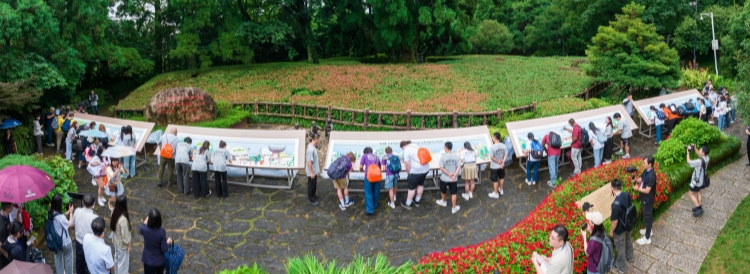

Nestled on the outskirts of Fuzhou, Gushan Mountain, also known as Drum Mountain, is celebrated for its stunning natural beauty and rich historical and cultural heritage. It is also the birthplace of the renowned Banyan Rock Tea, named for its unique growing environment: Banyan, meaning "half-rock", refers to the tea's cultivation midway up the mountain slopes. In ancient times, Gushan's Banyan Rock Tea enjoyed equal fame with the illustrious Beiyuan Tribute Tea and Wuyi Tea.

Tender tea leaves on Gushan Mountain [Photo provided to bondwithkuliang.org.cn]
Today, Gushan Mountain still bears the traces of its deep-rooted tea culture. Visitors can explore remnants of ancient tea pavilions, the "Tianshanyan Rock Tea Mountain Memorial Stone", the old Banyan Tea plantation site, and the picturesque Crystal Mountain Tea Garden. The centuries-old tradition of serving tea to visitors at Yongquan Temple continues to this day, adding a spiritual touch to the mountain's tea culture.
From April to early May, Gushan Mountain's tea gardens are at their most enchanting. Tender tea buds sprout, flowers bloom, and the soft spring sunlight bathes the mountain in warmth, creating the perfect conditions for tea picking.

Lush greenery blankets the tea gardens of Gushan Mountain. [Photo provided to bondwithkuliang.org.cn]
Step into the Crystal Tea Garden and behold the tea bushes unfurling in rows across the slopes like waves of green. After resting through the winter, the tea trees awaken with the arrival of spring, sending forth delicate new shoots. Backed by the towering mountain and facing the confluence of rivers, the mist-shrouded tea gardens exude an ethereal charm, steeped in the essence of tea culture.
This is the busiest season in the tea gardens. Tea pickers, clad in straw hats and carrying bamboo baskets, move swiftly among the bushes. Their practiced fingers gently pluck the tender leaves, each capturing a handful of spring's vitality.

A tea picker plucks fresh leaves and places them into a bamboo basket. [Photo provided to bondwithkuliang.org.cn]
The fresh leaves quickly make their way to the tea processors. "Every bud and leaf matters. From picking to the critical stage of fixation, the entire process must be completed within eight hours to retain the tea's freshness", explains master tea maker Xie Fei, as he deftly stirs and aerates the leaves. The withering, rolling, fermenting, and firing process fills the mountain air with the delicate aroma of spring tea.
From its origins, Gushan Mountain's Banyan Rock Tea has been intertwined with Chan, also known as Zen. The tradition of Gushan Chan Tea traces back to the foundation of the Yongquan Temple. Over the centuries, countless scholars have journeyed to Gushan in search of both spiritual and tea wisdom. As the Chan saying goes, "Go have tea." For modern-day visitors, tea on Gushan is more than a beverage—it's a moment of clarity, a sip of serenity, and a taste of insight into life itself.
